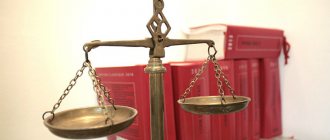If a citizen has suffered moral harm (physical or moral suffering) by actions that violate his personal non-property rights or encroach on intangible benefits belonging to the citizen, as well as in other cases provided for by law, the court may impose on the violator the obligation of monetary compensation for the specified harm.
When determining the amount of compensation for moral damage, the court takes into account the degree of guilt of the offender and other circumstances worthy of attention. The court must also take into account the degree of physical and moral suffering associated with the individual characteristics of the citizen who suffered harm.
- Article 150. Intangible benefits
- Article 152. Protection of honor, dignity and business reputation
Commentary to Art. 151 Civil Code of the Russian Federation
1. The commented article makes an unsuccessful attempt to explain the concept of moral damage and determine the general requirements for the conditions and procedure for its compensation. Similar rules on the conditions, procedure and amount of compensation for moral damage are enshrined in Art. Art. 1099 - 1101 Civil Code. In addition, since compensation for moral damage is a universal measure of liability for violation of intangible benefits, it is mentioned in Art. 12 GK. It would be more correct to combine all the rules on moral harm in one article.
2. Moral harm is understood as moral or physical suffering caused by actions (inaction) that infringe on intangible benefits belonging to a citizen from birth or by force of law (life, health, personal dignity, business reputation, privacy, personal and family secrets, etc.) .p.) or violating his personal non-property rights (the right to use his name, the right of authorship and other non-property rights) or, in cases established by law, violating the property rights of a citizen (paragraph 1, paragraph 2 of Supreme Court Resolution No. 10).
The specificity of the elements of a civil offense (unlawful act, harm, causation and, as a general rule, guilt (see for more details Art. 1099 - 1101 of the Civil Code)) as a basis for compensation for moral damage is manifested in the following. Firstly, the object of unlawful encroachments is, as a general rule, any intangible benefits (rights to them), regardless of whether they are named in the law and whether the appropriate method of their protection is mentioned (see also paragraphs 2 - 4 of paragraph 4 of the Supreme Court Resolution N 10). In particular, the Constitutional Court pointed out the possibility of applying Art. 151 in cases of non-execution of court decisions on claims against the Russian Federation, constituent entities of the Russian Federation or municipalities, since the right to defense is personal non-property (see Constitutional Court Decision of July 3, 2008 No. 734-O-P “On the complaint of citizen V. for a violation her constitutional rights in Article 151 of the Civil Code of the Russian Federation" (SZ RF. 2009. N 5. Art. 678)). On the contrary, compensation for moral damage for violation of property rights is an exception, which is why a special indication of the law is necessary on the possibility of applying this measure of liability (see, for example, Article 15 of the Law on the Protection of Consumer Rights).
Secondly, due to the characteristics of the object of attack, the harm caused is not expressed in any material losses, but in human suffering of a physical or moral nature. In this sense, without going into controversy, moral damage is non-property - as opposed to material damage, consisting of real damage and lost profits and traditionally called losses (see commentary to Article 15 of the Civil Code; paragraph 1 of paragraph 10 of the Supreme Court Resolution N 10). Only individuals can experience suffering as a manifestation of a psycho-emotional state, although some intangible benefits are also inherent in legal entities (for example, the right to a good name).
It is believed that physical suffering manifests itself in the form of any unpleasant physiological or painful sensations (for example, nausea, pain, itching, etc.). Moral suffering is any negative emotions or feelings, for example in the form of experiences in connection with the loss of relatives, the inability to continue an active social life, loss of a job, the disclosure of family or medical secrets, the dissemination of untrue information discrediting the honor, dignity or business reputation of a citizen, temporary restriction or deprivation of any rights, physical pain associated with injury, other damage to health or in connection with a disease suffered as a result of moral suffering, etc. (paragraph 2, paragraph 2 of the Supreme Court Resolution No. 10).
Thirdly, since the peculiarities of the protection of intangible benefits are manifested, among other things, in the impossibility of completely restoring the previous state, the legislator uses the special term “compensation”, emphasizing that bringing to responsibility in such cases is aimed precisely at making amends for the harm caused by paying compensation (a kind of consolation) in cash or other material form (paragraph 1, clause 10 of the Supreme Court Resolution No. 10). The amount of compensation does not depend on the amount of property damage, since we are talking about independent measures of liability that can be applied both alongside and independently (paragraph 1, paragraph 9 of the Supreme Court Resolution No. 10).
In Art. 151 of the Civil Code speaks only of monetary compensation for moral damage. This rule is based on the idea of money as a universal equivalent and takes into account that such an obligation can be enforced within the framework of enforcement proceedings. At the same time, judicial practice rightly follows the path of allowing other forms of material compensation (for example, in the form of providing medicine, a trip to a health resort, caring for the sick, etc.). However, since it is impossible to force the violator to provide compensation in a form other than monetary, making amends for moral damage in this way is permissible with the consent of the victim and the violator.
3. The Civil Code does not contain specific instructions regarding the determination of the amount of compensation for moral damage. Taking into account the provisions of the law and the requirements of reasonableness and fairness, when determining the amount of compensation, the court in each case must take into account the degree of physical and moral suffering associated with the individual characteristics of the person who suffered harm, the degree of guilt of the offender and other relevant circumstances (for example, what is confirmed by the fact of causing moral or physical suffering to the victim, under what circumstances and by what actions (inaction) they were caused, what moral or physical suffering was suffered, in what amount the victim estimates their compensation, the property status of the inflictor, etc.) (see more details in paragraph. 2 clause 1 of the Supreme Court Resolution No. 10, clause 15 of the Supreme Court Resolution No. 3). Due to the evaluative nature of the concepts “degree of suffering”, “personality characteristics”, etc. in science it is proposed to develop certain criteria (tables) for their calculation, but without a legislative decision this idea can hardly be translated into reality. Currently, the degree of moral or physical suffering is assessed by the court taking into account the actual circumstances of the infliction of moral harm, the individual characteristics of the victim and other specific circumstances indicating the severity of the suffering he suffered (paragraph 2, paragraph 8 of the Supreme Court Resolution No. 10).
4. If the claim for compensation for moral damage arises from violations of intangible benefits (rights to them), the rules on limitation of actions by virtue of Art. 208 of the Civil Code do not apply (except for cases provided for by law). On the contrary, when a claim for compensation for moral damage arises from a violation of property rights, for the protection of which a statute of limitations has been established (Article 195 of the Civil Code) or a deadline for filing a lawsuit (see, for example, Art. 392 of the Labor Code), it is subject to the rules on the appropriate deadlines (Clause 7 of the Supreme Court Resolution No. 10).
Subtleties and nuances
Due to the large number of regulations on which judicial authorities rely when considering cases related to compensation for moral damage, great difficulties often arise. Taking into account comments from the Plenum of the Supreme Court, judges must determine the type of relationship between the participants in the process, and also rely on specific legislative acts related to certain cases. The admissibility of compensation for damages, taking into account specific legal provisions and the time of entry into force of the law that regulates this procedure, is always taken into account.
The level of suffering of the victim must be assessed from the point of view of the actual damage caused, as well as the individual characteristics of the citizen who experienced moral losses. This list includes special conditions, such as pregnancy, the presence of chronic diseases, increased excitability and much more. In some cases, the victim must pay a state fee, but sometimes he is exempt from this obligation. Claims can be satisfied in full, although judges often refuse to compensate the plaintiff for damages. The victim always has the right to appeal the decision and file a second claim.
Judicial practice under Article 151 of the Civil Code of the Russian Federation
Ruling of the Supreme Court of the Russian Federation dated August 14, 2018 N 78-КГ18-38
Resolving the dispute on the merits and partially satisfying the claims of Zolotarev A.E. on the recovery of compensation for moral damage from the Ministry of Finance of the Russian Federation, the court of first instance, referring to the provisions of Article 151, paragraphs 1 and 3 of Articles 1070, 1071, Articles 1100 and 1101 of the Civil Code of the Russian Federation, proceeded from the fact that moral damage was caused to the plaintiff as a result illegal criminal prosecution, which was established by a court verdict that entered into legal force, which recognized the right of Zolotarev A.E. for rehabilitation, in connection with which he came to the conclusion that it was proven that the plaintiff had suffered moral suffering as a result of such persecution.
ECtHR ruling dated June 20, 2017
15. In her statement of claim, the applicant complained that the unlawful publication of her son's photograph in a booklet calling for children to be adopted had defamed her and her son's honour, dignity and reputation. In particular, the photograph was published without her knowledge or consent. The booklet was sent to various organizations in the city of Usolye and the Usolsky district of the Perm Territory (libraries, hospitals, police stations) and caused a negative attitude towards her and her son from colleagues, neighbors and relatives. The people around her decided that she had abandoned her son. The boy became the object of ridicule in kindergarten. In addition, the publication of the photo affected her honor and dignity and her reputation as a school teacher. With reference to Articles 151 and 152 of the Civil Code of the Russian Federation (see the section “Relevant legislation of the Russian Federation and law enforcement practice” of this Resolution), she asked the court to award her compensation for moral damages and oblige the publishing house to apologize for publishing the photo.
ECtHR ruling dated June 27, 2017
51. Articles 151 and 1099 - 1101 of the Civil Code of the Russian Federation provide for compensation for moral damage. Article 1099 of the Civil Code of the Russian Federation, in particular, indicates that compensation for moral damage is carried out regardless of the property damage subject to compensation. LAW I. Alleged violation of Article 6 of the Convention
Appeal ruling of the Judicial Collegium for Criminal Cases of the Supreme Court of the Russian Federation dated June 14, 2018 N 19-APU18-11
Contrary to the arguments of the appeals, the claims of the victim Amanbaev O.N. for compensation for material damage - funeral expenses and compensation for moral damage in connection with the death of a close relative - the daughter was allowed by the court in accordance with the provisions of Art. Art. 151, 1064, 1099 - 1101 Civil Code of the Russian Federation. The Judicial Panel finds no grounds to question the court's conclusions about the amount of compensation.
Appeal ruling of the Judicial Collegium for Criminal Cases of the Supreme Court of the Russian Federation dated May 17, 2018 N 4-APU18-18SP
The civil claim of the victim was considered in accordance with the requirements of Art. 151, 1099 - 1101 Civil Code of the Russian Federation. The amount of compensation for moral damage caused by the crime is in the amount of 1 million rubles, which was decided to be recovered from K.V. Shabunin. in favor of M. corresponds to the principles of reasonableness and justice.
Appeal ruling of the Judicial Collegium for Criminal Cases of the Supreme Court of the Russian Federation dated June 19, 2018 N 87-APU18-1
The decision regarding the claim for damages was made by the court in accordance with the provisions of Art. 1064 of the Civil Code of the Russian Federation, the amount of compensation for moral damage recovered in favor of victims L., S. and T. was determined by the court on the basis of Art. Art. 151, 1099 and 1101 of the Civil Code of the Russian Federation, taking into account the circumstances of the criminal case and the financial situation of the parties, while it corresponds to the degree of moral suffering of the plaintiffs, the requirements of reasonableness and fairness, and therefore is not subject to reduction.
Appeal ruling of the Judicial Collegium for Criminal Cases of the Supreme Court of the Russian Federation dated May 16, 2018 N 5-APU17-108SP
The issues of compensation for damage and compensation for moral damage were resolved by the court correctly, based on the established factual circumstances of the case and in accordance with the requirements of Art. Art. 1064, 151 Civil Code of the Russian Federation. Guided by Art. Art. 389.15, 389.20, 389.28, 389.33 Code of Criminal Procedure of the Russian Federation, Judicial Collegium
Appeal ruling of the Judicial Collegium for Criminal Cases of the Supreme Court of the Russian Federation dated 06.06.2018 N 19-APU18-8
Contrary to the arguments of the appeal of the convicted person, the claims of victims K. and Ya. for compensation for material damage and compensation for moral damage in connection with the death of a close relative - the mother - were resolved by the court in accordance with the provisions of Art. 151, 1064, 1099 - 1101 Civil Code of the Russian Federation. The Judicial Panel finds no grounds to question the court's conclusions about the amount of compensation.
Appeal ruling of the Judicial Collegium for Criminal Cases of the Supreme Court of the Russian Federation dated June 20, 2018 N 78-APU18-11
Thus, the court of first instance reasonably recovered compensation for moral damages from those convicted in favor of victims M.K. and V., while taking into account the degree of physical and moral suffering of each victim associated with emotional experiences as a result of the discovery and awareness of the use of explosive devices, the actual circumstances , in which moral harm was caused and the individual characteristics of the victims, the amount of suffering they suffered, the requirements of reasonableness and justice, as well as the financial situation of the convicts and the composition of their families, in full accordance with Articles 151, 1064, 1099, 1100, 1101 of the Civil Code of the Russian Federation.
Appeal ruling of the Judicial Collegium for Criminal Cases of the Supreme Court of the Russian Federation dated June 21, 2018 N 33-APU18-9sp
In the appeal, victim A. indicates that the crime committed by Isakova caused her moral harm caused by the death of her sister. She believes that when considering her civil claim the court did not take into account the provisions of Art. 151 of the Civil Code of the Russian Federation, Resolution of the Plenum of the Supreme Court of the Russian Federation of December 20, 1994 “Some issues of application of legislation on compensation for moral damage.” Due to the loss of her sister, she, being a disabled person of the first group, is in a depressed, depressed state. Psychological trauma associated with the loss of a loved one manifests itself in detachment, nightmares, extreme irritation, sleep disturbances, headaches, and lack of appetite.
Appeal ruling of the Judicial Collegium for Criminal Cases of the Supreme Court of the Russian Federation dated June 20, 2018 N 81-APU18-8
Since, as established by the court, the victim I. by the actions of Legkova R.M., Legkova I.A., Golovin V.S. and Mikheeva A.S. moral damage was caused, then in accordance with Art. 151 of the Civil Code of the Russian Federation, the court made the correct decision on the convicts paying her monetary compensation for moral damage.
Options and amounts of compensation
Taking into account the information given in Article 151, punishment for non-physical harm may entail the payment of compensation, which is always paid in monetary terms. There are no other options for compensation in such cases, or at least they have not yet been encountered in global legislative practice. The amount of compensation is determined by the court in accordance with the type of case after studying all the nuances and details of the individual case. There is no case law in the Russian Federation, so judges themselves always calculate and assess the amount that the defendant must pay to the plaintiff.
Important! Usually, when filing a claim in court, the victim indicates a specific amount in the application and expects to receive compensation in that exact amount. But even if the case is won, the amount of compensation is usually less than stated.
The duty of the judge is to competently assess the situation, taking into account the norms of morality and law, and he must additionally take into account a number of criteria. This includes the type, form and degree of moral damage caused to the plaintiff, the level of guilt of the defendant, and he may or may not admit it immediately. The connection between physical damage and moral losses is also taken into account if moral damage affected the state of health and provoked its deterioration. It is extremely important that the judge act in accordance with the law, and also rely on the principles of reasonableness and fairness.
Resolution of the Plenum of the Supreme Court “On compensation for moral damage”
In order to ensure the correct and uniform application of the legislation regulating compensation for moral damage, the most complete and rapid protection of the interests of victims when courts consider cases of this category, the Plenum of the Supreme Court of the Russian Federation decides to give the following clarifications:
1. Considering that issues of compensation for moral damage are regulated by a number of legislative acts put into effect at different times, the court in order to ensure the correct and timely resolution of the dispute that has arisen needs to find out in each case the nature of the relationship between the parties and by what legal norms they are regulated, whether the legislation allows the possibility compensation for moral damage for this type of legal relationship and, if such liability is established, when the legislative act came into force providing for the conditions and procedure for compensation for damage in these cases, as well as when actions were committed that caused moral damage.
The court should also establish what confirms the fact of causing moral or physical suffering to the victim, under what circumstances and by what actions (inaction) they were caused, the degree of guilt of the inflictor, what kind of moral or physical suffering the victim suffered, in what amount he estimates their compensation and other circumstances, relevant for resolving a particular dispute.
(Resolution of the Plenum of the Supreme Court on compensation for moral damage)
Grounds for compensation for intangible benefits: in what cases can a claim be filed?
Significant circumstances for the court that influence the decision in favor of satisfying the claims of the injured person are factors influencing the intensity of suffering .
Physical injury to a person and his loved ones
- When causing physical harm to health and life, the court is obliged to take into account the type and level of severity of the damage.
- When compensating for moral damage to the relatives of a deceased person, the legal process includes: in what place and how exactly the death occurred (in the presence of family members or not).
For example, damage to a vein may not cause acute pain, but the victim can suffer mental trauma due to fear of death.
Moral suffering
- Moral damage consists of infringement of honor and dignity - in this case, the nature and magnitude of the shame, the breadth of dissemination of information, the results of such actions (family breakdown, dismissal, etc.) are taken into account in the judicial process.
- In case of non-compliance with labor legislation, it is necessary to take into account the damage to the employee’s image, the likelihood of further employment, and the economic situation in the family.
- When publishing information that harms the victim’s reputation in the media, the court calculates the required amount of compensation, based on the essence of the publication and the veracity of the information .
Normative base
4. When considering the victim’s demands for compensation for the moral or physical suffering he has suffered, it should be borne in mind that issues of compensation for moral damage , in particular, were regulated by: Part 7 of Article 7 of the Civil Code of the RSFSR (as amended by the Law of March 21, 1991); Article 62 of the Law of the Russian Federation of December 27, 1991 “On the Mass Media”, put into effect on February 8, 1992 (from August 1, 1990 until February 8, 1992, Article 39 of the USSR Law of June 12, 1990 was in force "On the press and other media"); Article 89 of the Law of the Russian Federation of December 19, 1991 “On the Protection of the Natural Environment” (entered into force on March 3, 1992), which was in force until January 12, 2002; ….
Currently, issues of compensation for moral damage , in particular, are regulated by Articles 12, 150 - 152 of the first part of the Civil Code of the Russian Federation, which came into force on January 1, 1995; Articles 1099 - 1101 of the second part of the Civil Code of the Russian Federation, entered into force on March 1, 1996; Article 15 of the Law of the Russian Federation of February 7, 1992 “On the Protection of Consumer Rights,” in force since January 16, 1996; Part 5 of Article 18 of the Federal Law “On the Status of Military Personnel” of May 27, 1998, which came into force on January 1, 1998; Article 237 of the Labor Code of the Russian Federation, entered into force on February 1, 2002;….
(Resolution of the Plenum of the Supreme Court on compensation for moral damage)







